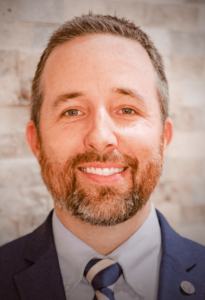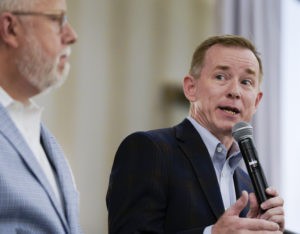One of the most conservative public voices within the Southern Baptist Convention announced Jan. 4 that his Georgia church has left the SBC.
Josh Buice is pastor of Pray’s Mill Baptist Church in Douglasville, Ga., and founder of an online network called G3, whose founding intent was to create “a theology conference that would focus on God’s Word as opposed to the pragmatism and techniques that are so often the focus of evangelical conferences.”
The annual G3 conference attracts thousands of participants, and Buice himself has nearly 30,000 followers on Twitter. According to the latest statistics published online by the Georgia Baptist Convention, in 2020 his church reported 341 members and gave nothing through the SBC’s Cooperative Program budget; the church did give $3,798 through “Great Commission Giving,” which is an option for Georgia churches to bypass the full SBC budget and give only to select causes.

Josh Buice
Buice represents a younger generation of Reformed Baptists — sometimes referred to as TheoBros — who typically serve small ultraconservative churches and frequently debate the finer points of theology at conferences and online, especially via Twitter. Buice holds a doctor of ministry degree from Southern Baptist Theological Seminary, led by President Al Mohler, who is among the best-known Neo-Calvinists in the SBC.
In a 2,400-word statement posted to social media, Buice said the “final straw” for him and his congregation was the election of Alabama pastor Ed Litton as SBC president last June. In a five-way race for the presidency, Litton by a narrow margin defeated Georgia pastor Mike Stone, who had been endorsed by the most conservative factions of the denomination. Litton was considered a centrist in the race.
At the time, Stone found himself at the center of a still-swirling controversy about allegations of SBC leaders mishandling knowledge of sexual abuse within SBC congregations and institutions. Nevertheless, he was heartily endorsed by the mainly male group of conservative hardliners and Calvinists in the SBC.
Ironically, another high-profile defection from the SBC last year was driven by the opposite forces as those motivating Buice. Popular Bible teacher Beth Moore left the denomination, citing SBC leaders’ embrace of Donald Trump and apologizing for her own previous complicity with the teaching of complementarianism.
Moore’s departure and now Buice’s departure for opposite reasons illustrate the tightrope SBC leaders are walking while trying to hold together the nation’s largest non-Catholic denomination. Amid the rise of Trumpism and the current national reckoning over sexual abuse and race, even a largely conservative body like the SBC is being pulled apart.
“Amid the rise of Trumpism and the current national reckoning over sexual abuse and race, even a largely conservative body like the SBC is being pulled apart.”
As reasons for breaking away, Buice cited a “devious deconstruction plan that has been at work for many years behind the scenes” in the SBC and “acceptance of the social justice agenda which has resulted in the greatest downgrade in our modern era of church history.”
“All is not well within evangelicalism and that also includes the SBC,” he wrote. “In recent years, we’ve witnessed quite a transformation take place within the once beloved SBC that has necessitated separation for what I believe is far more than preference matters.”
Echoing the frequent accusations of the Conservative Baptist Network and Founders Ministries — the two most visible rightwing groups within the SBC — Buice charged that the SBC is experiencing a “leftward” drift.
“The biggest catalyst to this leftward movement undoubtedly was the acceptance of the social justice agenda,” he said. “Any denial of this downgrade is simply a refusal to report the facts about where the SBC is today, where the SBC was yesterday, and where the SBC is moving tomorrow.”
On June 19, 2018, Buice organized a meeting in Dallas attended by independent Calvinist pastor John MacArthur and other evangelical leaders — including some SBC leaders — to address the perceived threat of social justice to their understanding of the gospel. That group produced a document called the “Statement on Social Justice and the Gospel,” or just “The Dallas Statement.” The president of Founders Ministries, Tom Ascol, wrote the first draft of the statement.
“The biggest catalyst to this leftward movement undoubtedly was the acceptance of the social justice agenda.”
Such a “liberal” idea as a social gospel is creating “an onslaught of dangerous and false teachings that threaten the gospel, misrepresent Scripture, and lead people away from the grace of God in Jesus Christ,” it says.
That was a full year before the controversial SBC resolution on Critical Race Theory — also simply known as Resolution Nine — was adopted in June 2019. That resolution allowed that Critical Race Theory and intersectionality — which hardly anyone could define at the time — are simply analytical tools that are not harmful so long as they do not supersede the gospel.
That outcome was viewed as disastrous by Buice, Ascol and others on the SBC’s rightward edge. They see Critical Race Theory as Marxist-inspired heresy leading to a leftist worldview. These critics of Resolution Nine worked for two years to try to rescind or replace the resolution, which still failed at the June 2021 SBC annual meeting.
Current SBC leaders, Buice charges in his departure letter, have doubled down on their failure to denounce the social gospel. “They have sought to deflect charges of theological capitulation and rigorously work to protect their positions through cultural virtue signals and theological word salads,” he wrote.
“They see Critical Race Theory as Marxist-inspired heresy leading to a leftist worldview.”
“If left unchecked, the social justice agenda will leave an indelible mark upon preachers who will be sent out into local churches to serve as pastor,” he warned.
Further, the leftward influence in the SBC has created “a progressive attack upon the pulpit,” he added. “As the progressive winds continue to blow through evangelical circles, it seems that in order to continue to maintain the big tent approach to evangelicalism, the SBC must allow for women to preach so long as they are not ordained to the office of elder. We have watched the rise of popular figures like Beth Moore continue to weave this methodology into the fabric of the SBC through the years.”
He called this “a crock-pot approach to compromise and failure” and explained that “the slow cook of pragmatism has led the SBC to embrace theological error in order to become culturally relevant which has been quite evident through the virtue signaling of major SBC leaders in the wake of tragedies like George Floyd and the rise of the Black Lives Matter movement. Pragmatism demands that you do whatever works and provides the best results.”

Mike Stone speaks during an event at the SBC annual meeting in June 2021, while Ed Litton looks on. Litton defeated Stone in a run-off election for SBC president. (Baptist Press)
Regarding SBC President Litton, Buice echoed the charges of Founders Ministries leaders and other advocates for Mike Stone that Litton is a sermon plagiarist. After his election, Litton admitted that he had borrowed some sermon material from former SBC president J.D. Greear with permission but has denied wider charges of plagiarism.
“Rather than calling for his resignation, the 11th Commandment of the SBC appears to be in full force as the SBC elites not only enable his capitulation, but they celebrate him as a faithful leader,” Buice said, citing specifically Danny Akin, president of Southeastern Baptist Theological Seminary, and Adam Greenway, president of Southwestern Baptist Theological Seminary.
Greenway, he said, had the audacity to invite the duly elected SBC president to address the student body at Southwestern Seminary “where Greenway asked Litton to respond to allegations of plagiarism and then accepted his answer and applauded him.”
“As the pulpit goes, so goes the church,” Buice concluded. “This was the final straw for me and for our local church. We refuse to be associated with a group of churches that elect and support leaders who will not be held accountable for sin.”
Related articles:
What the Critical Race Theory debate has to do with Professor Harold Hill | Opinion by Mark Wingfield
Southern Baptists are still obsessed with Critical Race Theory


